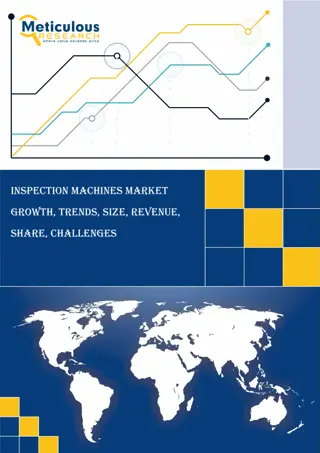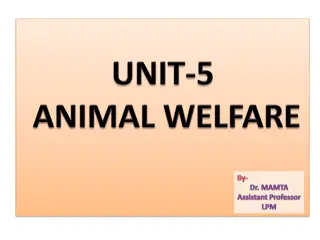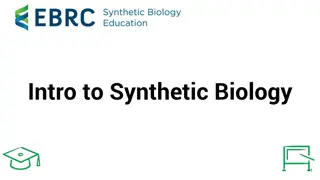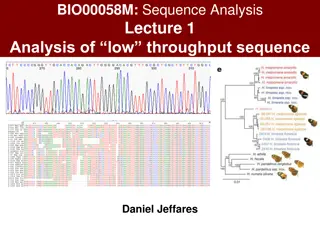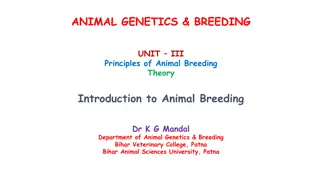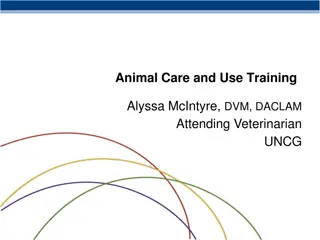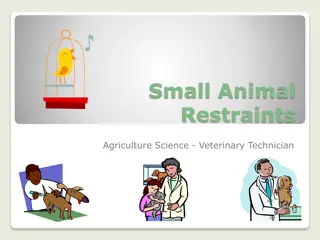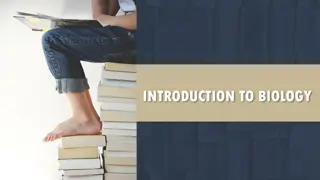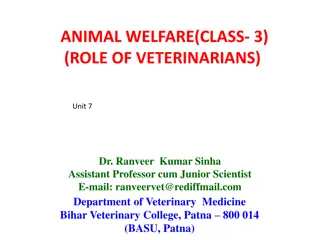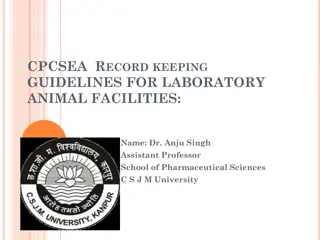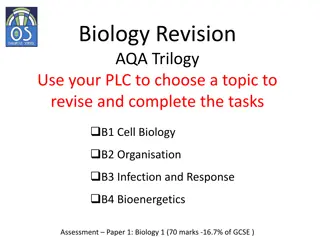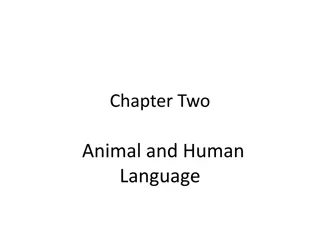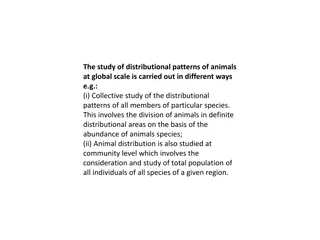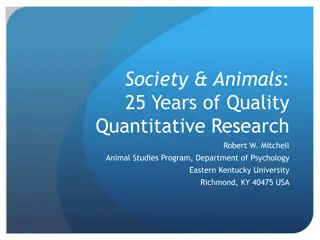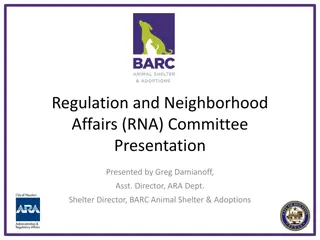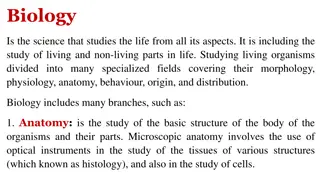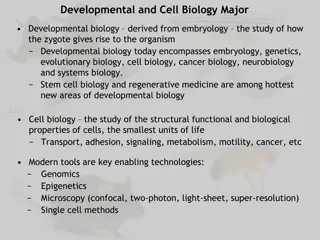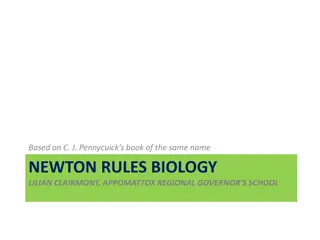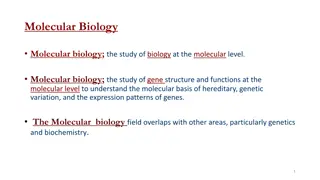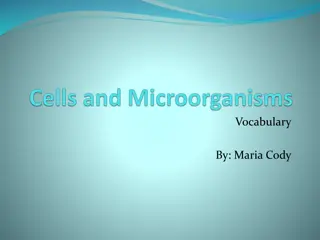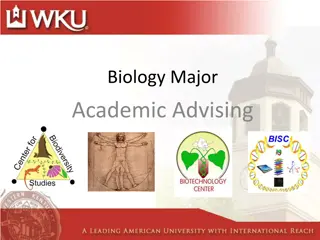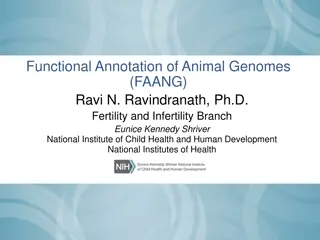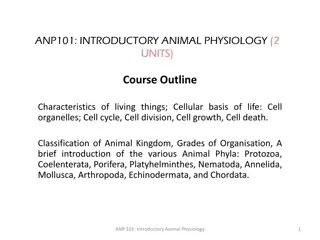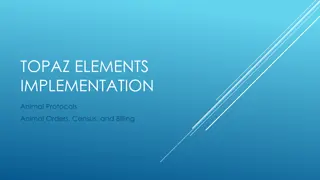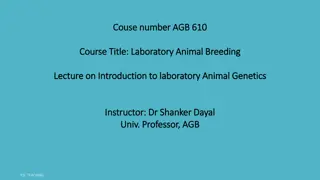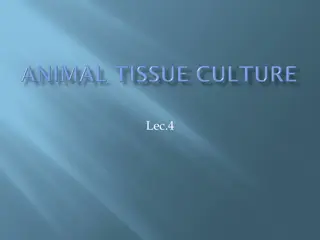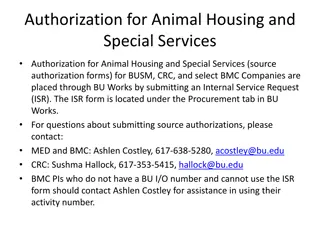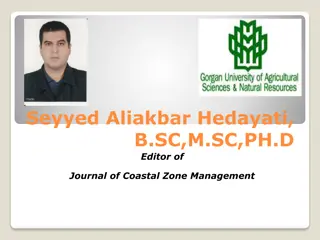History and Educational Programs of DEU Lab Animal Science Department
Established in 2004, the Department of Laboratory Animal Science at Dokuz Eylul University Institute of Health Sciences offers cutting-edge education focusing on animal welfare and ethical practices in scientific research. The department upholds the 3R Principle—Reduction, Refinement, Replacement�
0 views • 9 slides
8th Singapore Junior Biology Olympiad 2023 Pre-registration Briefing Information
The 8th Singapore Junior Biology Olympiad (SJBO) 2023 aims to promote the advancement of Biology among Secondary School students from Sec 2-4 levels in Singapore. This prestigious competition encourages students to excel in Biology by focusing on practical skills and critical thinking. The structure
1 views • 34 slides
Responsibilities of Facility Animal Care Committee at McGill University
The Facility Animal Care Committee (FACC) at McGill University oversees animal activities, ensures ethical treatment of animals, and adheres to guidelines from organizations such as the Canadian Council on Animal Care (CCAC). Responsibilities include continual oversight of animals, approving care pr
1 views • 13 slides
Feed Software Market is expected to reach $456.1 million by 2030
The growth of this market is attributed to the adoption of digital technologies and automation in the animal feed industry, the growing animal population, increasing demand for healthy animal-based food products, increasing animal health expenditure and pet insurance, and the growing need to reduce
0 views • 4 slides
Achieve Greatness Conquer the IB Biology Diploma Programme Exam
Unlock your potential and excel in the IB Biology Diploma Programme Exam with our comprehensive study resources. Gain access to practice tests, study guides, and expert guidance to elevate your performance. Start your journey towards academic success today!\nClick Here to Get IB-Biology Dumps With 1
0 views • 6 slides
Animal Welfare and Ethics: Standards and Regulations in India
The content covers a wide range of topics related to animal welfare, ethics, and laws in India. It delves into the definition of animal welfare, the role of veterinarians, animal welfare organizations, regulations like the Prevention of Cruelty to Animals Act, and protection of wildlife, working ani
0 views • 15 slides
Introduction to Synthetic Biology: Understanding the Core Concepts and Applications
In this introductory lecture on synthetic biology, you will explore the fundamental principles of engineering biology, including the design and construction of new biological entities. The focus is on leveraging molecular, cell, and systems biology advancements to create biological systems that can
0 views • 89 slides
Transformative Power of Sequencing in Molecular Biology
The falling costs of sequencing have revolutionized various fields like genetics, genomics, cell biology, microbiology, and evolutionary biology. Sequencing data has enabled us to understand genomes, revolutionize cell biology techniques, conduct comparative genomics, population genomics, and metage
1 views • 31 slides
Principles of Animal Breeding: Introduction and Historical Perspective
This unit covers the introduction to animal breeding, the application of genetics principles in breeding, historical perspectives including the work of Robert Bakewell, and key events in animal breeding evolution. Topics include breeding systems, importance of animal breeding, and notable figures in
1 views • 12 slides
Importance of Training in Animal Care and Use for Research
Training in animal care and use is essential to ensure humane and appropriate treatment of research animals, promote regulatory compliance, and uphold high standards of science and animal well-being. The presentation covers the necessity of training, goals including reviewing animal use and identify
0 views • 53 slides
Small Animal Restraints and Safe Handling Practices in Veterinary Technology
Importance of safe practice when working with small animals includes preventing harm, reducing injury, and minimizing stress. Proper animal handling methods and tools are crucial for the safety of both animals and handlers. Common methods of handling different species, demonstrating appropriate anim
1 views • 22 slides
Understanding the Difference: Animal Rights vs. Animal Welfare
Explore the nuanced distinction between animal rights and animal welfare, delving into the ethical considerations, philosophies, and advocacy efforts surrounding these concepts. Discover how animal rights proponents emphasize the equal rights of animals, while animal welfare focuses on humane treatm
0 views • 36 slides
Basics of Biology: Introduction, Branches, and Importance
Biology, the study of living organisms, encompasses various branches such as botany, zoology, morphology, and genetics. Understanding biology is crucial for solving environmental issues, conserving natural resources, and pursuing careers in diverse fields like medicine and agriculture. Living organi
0 views • 9 slides
Role of Veterinarians in Animal Welfare
Veterinarians, especially with the increasing number of female professionals in the field, play a crucial role in promoting animal welfare through daily practices, advocacy, education, and research. They are involved in various sectors like biomedical, wildlife, and farm animal research, as well as
3 views • 10 slides
Exploring Animal Management and Sociology in Education
Discover the intersection of animal management and sociology in education through a comprehensive course structure that covers topics ranging from animal welfare and ethics to practical husbandry. Dive into the significance of animal care in the UK economy and learn about various career paths in thi
2 views • 19 slides
Laboratory Animal Facilities Record-keeping Guidelines
Guidelines for maintaining records in laboratory animal facilities include provisions for animal housing, staff records, health monitoring, and standard operating procedures. Compliance with CPCSEA regulations ensures ethical review procedures for animal research proposals. Focus is on providing a s
6 views • 11 slides
Understanding Allergies to Animals and Living Organisms
Allergies to animals and living organisms are a result of specific immune processes triggered by allergenic substances like proteins and peptides. This allergic response can be caused by various animal proteins such as dog allergens Can f.1, Can f.2, and Can f.3, and cat allergen Fel d1. The represe
1 views • 10 slides
Biology Revision with AQA Trilogy: Cell Biology and Organism Organization
In this biology revision session for AQA Trilogy, we delve into topics like cell biology, organism organization, diffusion, osmosis, active transport, enzymes, and more. Explore the differences between prokaryotes and eukaryotes, understand cell specialization, and learn about key processes like mit
0 views • 8 slides
Shuttleworth College Animal Management Course Overview
Shuttleworth College offers an Animal Management course focusing on various aspects such as Animal Breeding, Welfare, Biology, Husbandry, Behavior, and more. The program includes practical and theoretical components with assessments and work experience opportunities. Students are guided by dedicated
0 views • 15 slides
Uniqueness of Human Language and Communication Contrasted with Animal Communication
Human language possesses unique properties such as reflexivity, displacement, and arbitrariness, setting it apart from animal communication. These distinctions enable humans to communicate abstract concepts, discuss past and future events, and use arbitrary linguistic forms. The contrast between hum
1 views • 17 slides
Trilogy Plenary Extended Writing Questions in Biology, Chemistry, and Physics
Explore detailed questions and content covering Biology topics such as Cell Biology, Transport in Cells, Animal Tissues, Organs and Organ Systems, Infection & Response, Bioenergetics, Homeostasis, and Ecology. Dive into Chemistry and Physics sections for a comprehensive study on various topics. Unde
0 views • 92 slides
Understanding Global Animal Distribution Patterns
The study of animal distribution patterns at a global scale involves analyzing species abundance and diversity in specific areas. Factors like environmental conditions, latitudes, and evolutionary history influence animal distributions. There are horizontal and vertical zones of animal distribution,
1 views • 25 slides
Exploring Human-Animal Interactions through 25 Years of Quality Research
Delve into the interdisciplinary realm of human-animal interactions with a focus on social sciences and quantitative research. Discover key themes such as social psychology, therapy, animal welfare, and more. Explore attitudes and personality differences related to animal treatment, empathy, and bel
1 views • 26 slides
BARC Animal Enforcement Programs and Protocols
BARC Animal Enforcement is responsible for addressing dangerous, aggressive, and nuisance dog cases in the community. Through a structured priority matrix and enforcement tools, BARC aims to ensure public safety and animal welfare. The process involves investigation, designation determination, and c
0 views • 15 slides
SASAS Strategic Plan Vision 2025 - Summary and Objectives
The SASAS Strategic Plan Vision 2025 aims to develop capacity in animal science to enhance animal production systems sustainably, promote welfare, job creation, and poverty alleviation. Informed by local, regional, and global imperatives, it aligns with the National Development Plan 2030, African Un
0 views • 11 slides
Exploring the Fascinating World of Biology and Human Biology
Biology is a broad scientific field encompassing the study of living organisms and their various aspects, from anatomy and physiology to genetics and evolution. Branches of biology include anatomy, histology, cytology, physiology, embryology, genetics, molecular biology, biochemistry, zoology, botan
0 views • 21 slides
Biology Program Overview at Southwest Ohio Region
The Southwest Ohio region offers a comprehensive Biology program with a diverse faculty, a large student enrollment, and articulation agreements with universities like University of Cincinnati and Wright State University. The Biology A.S. curriculum includes courses in biology, chemistry, compositio
0 views • 6 slides
Explore the World of Developmental and Cell Biology
Developmental biology, stemming from embryology, investigates how organisms evolve from a zygote. It merges various fields like genetics, cell biology, and cancer biology. Cell biology focuses on cell properties and behaviors, using tools like genomics and microscopy. Research areas include cancer c
0 views • 8 slides
Exploring Animal Performance Through Scaling and Geometry
This presentation delves into the impact of scaling and geometric similarity on animal performance, drawing from C.J. Pennycuick's work "Newton Rules Biology." Discussing factors such as gravity, surface area, and volume, it examines how animal characteristics change with size variations. The study
0 views • 23 slides
Exploring Molecular Biology and Cell Science
Molecular biology delves into the study of biology at the molecular level, focusing on gene structure and functions to comprehend hereditary traits, genetic variation, and gene expression patterns. Cells, the fundamental units of life, vary in shape and function but share basic structures. The Three
0 views • 31 slides
Philosophy of Biology: A Methodological Provocation Before the Emergence of Biology
Philosophy of biology before the formal establishment of biology as a discipline explores the evolution of terms and theories related to the science of life. By delving into key philosophical works from the 19th and 20th centuries, the interaction between history, philosophy, and science in the fiel
0 views • 13 slides
Exploring Biology: Key Terms and Concepts in Cell Biology
Dive into the fascinating world of biology with a focus on essential terms and concepts in cell biology. Learn about the structures and functions of cells, from bacteria to organelles, and understand the fundamental components that make up living organisms. Explore the roles of mitochondria, nucleus
0 views • 18 slides
Biology Major Academic Advising Overview
This overview covers the aims and expectations of a Biology major academic advising session, including requirements for graduation, grades, advisor information, and supporting courses. It details the importance of meeting academic standards, selecting electives, and understanding credit hour distrib
0 views • 15 slides
Importance of Functional Annotation of Animal Genomes in NIH Research
Functional Annotation of Animal Genomes (FAANG) is crucial for associating sequence variation with quantitative phenotypes in domestic animals, serving as important models for human health, disease, and ecology. The NIH actively participates in various genome projects involving cattle, horses, and c
0 views • 10 slides
Introduction to Animal Physiology and Cellular Biology Overview
This comprehensive course delves into the fundamental aspects of animal physiology and cellular biology. Topics covered include the characteristics of living organisms, cellular organelles, the cell cycle, division, growth, and death. Additionally, the course introduces the various animal phyla, fro
0 views • 43 slides
Upgrading to TOPAZ Elements: Enhancing Animal Protocols, Orders, Census, and Billing
The Animal Resource Facility (ARF) and Office of Animal Care Compliance (OACC) are shifting to TOPAZ Elements, a comprehensive web-based system, to streamline management of animal protocols, orders, census, and billing. This upgrade aims to provide better oversight for PIs, enhance compliance with r
0 views • 8 slides
Understanding Laboratory Animal Genetics and Research Importance
This course (AGB 610) delves into the realm of laboratory animal breeding, exploring the significance of using animals in research and teaching. Dr Shanker Dayal, a distinguished professor, guides students through lectures on animal genetics and the common uses of laboratory animals. The course emph
0 views • 14 slides
Understanding Animal Tissue Culture and Cell Line Production
Animal tissue culture involves growing tissues separate from the animal in a laboratory setting. To achieve exponential cell growth, cells are converted into immortal cell lines. The production of a cell line involves steps like breaking cell adhesion, incubation, and transferring cells to fresh med
0 views • 22 slides
Authorization for Animal Housing and Special Services Process Guidelines
The guidelines outline the process for authorizing animal housing and special services at BUSM, CRC, and select BMC Companies through BU Works via Internal Service Requests (ISR). Investigators must submit ISR forms for animal housing at the Animal Science Center, monitor charges, and provide advanc
0 views • 8 slides
Dr. Seyyed Aliakbar Hedayati - Marine Biology and Fisheries Expert
Dr. Seyyed Aliakbar Hedayati holds a Ph.D. in Marine Biology and is currently an Assistant Professor of Marine Biology at Gorgan University. His research interests include marine biology and fisheries. He has published various research papers on topics such as plasma metabolites in fish and length-w
0 views • 15 slides



